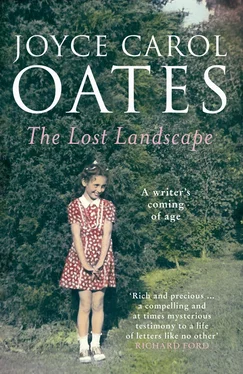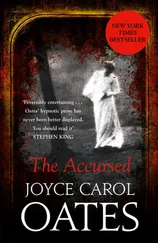1 ...8 9 10 12 13 14 ...17 In addition to the Alice books which I’d soon memorized we had, at home, the daunting The Gold Bug and Other Tales by Edgar Allan Poe, which was my father’s book: the title was in dull-gold letters on the book cover which was made of some odd, thick, dim material resembling mossy tree bark. What I could make of Poe’s belabored gothic prose, I can’t imagine. Though Poe’s classic tales seem to move, in our memories, with the nightmare rapidity of horror films, the prose in which Poe cast most of these tales is highly formal, tortuous, turgid if not opaque; his masterpiece “The Tell-Tale Heart” is unique in its head-on fluency. Yet, somehow, perhaps because I had few other books close at hand, I persevered in reading Poe as a young child, and must have absorbed, along with the very different prose-consciousness of Lewis Carroll, something of that writer’s unique sensibility. (No wonder my immediate kinship with Paul Bowles, whose first story collection, The Delicate Prey , is dedicated to his mother, who had read Bowles the tales of Poe as a young child.)
My child’s logic, which was not corrected by any adult because it would not have occurred to me to mention it to any adult, was that the mysterious world of books was divided into two types: those for children, and those for adults. Reading for children, in our grade-school textbooks, was simpleminded in its vocabulary, grammar, and content; it was usually about unreal, improbable, or unconditionally fantastic situations, like fairy tales, comic books, Disney films. It might be amusing, it might be instructive, but it was not real . Reality was the province of adults, and though I was surrounded by adults, as an only child for five years, it was not a province I could enter, or even envision, from the outside. To enter that reality, to find a way in , I read books.
Avidly, ardently! As if my life depended upon it.
One of the earliest books I read, or tried to read, was an anthology from our school library, an aged Treasury of American Literature that had probably been published before World War II. Mixed with writers who are mostly forgotten today (James Whitcomb Riley, Eugene Field, Helen Hunt Jackson) were our New England classics—though I was too young to know that Hawthorne, Emerson, Poe, Melville, et al. were “classics” or even to know that they spoke out of an America that no longer existed, and would never have existed for families like my own. I believed that these writers, who were exclusively male, were in full possession of reality . That their reality was so very different from my own did not discredit it, or even qualify it, but confirmed it: adult writing was a form of wisdom and power, difficult to comprehend but unassailable. These were no children’s easy-reading fantasies but the real thing, voices of adult authenticity. I forced myself to read for long minutes at a time, finely printed prose on yellowed, dog-eared pages, retaining very little but utterly captivated by the strangeness of another’s voice sounding in my ear. I tackled such a book as I would tackle a tree (a pear tree, for instance) difficult to climb. I must have felt almost physically challenged by lengthy, near-impenetrable paragraphs so unlike the American-English language spoken in Millersport, and totally unlike the primer sentences of our schoolbooks. The writers were mere names, words. And these words were exotic: “Washington Irving”—“Benjamin Franklin”—“Nathaniel Hawthorne”—“Herman Melville”—“Ralph Waldo Emerson”—“Henry David Thoreau”—“Edgar Allan Poe”—“Samuel Clemens.” There was no Emily Dickinson in this anthology, I would not read Emily Dickinson until high school. I did not think of these exalted individuals as actual men, human beings like my father and grandfather who might have lived and breathed; the writing attributed to them was them. If I could not always make sense of what I read, I knew at least that it was true.
It was the first-person voice, the (seemingly) unmediated voice, that struck me as truth-telling . For some reason, children’s books are rarely narrated in the first-person; Lewis Carroll’s Alice is always seen from a little distance, as “Alice.” (Yet we see everything through Alice’s amazed eyes, and we never know anything that Alice does not know.) But many of the adult writers whom I struggled to read wrote in the first person, and very persuasively. I could not have distinguished between the (nonfiction) voices of Emerson and Thoreau and the (wholly fictional) voices of Irving and Poe; even today, I have to think to recall if “The Imp of the Perverse” is a confessional essay, as it sets itself up to be, or one of the Tales of the Grotesque . I may have absorbed from Poe a predilection for moving fluidly through genres, and grounding the surreal in the seeming “reality” of an earnest, impassioned voice. Poe was a master of, among other things, the literary trompe l’oeil , in which speculative musings upon human psychology shift into fantastic narratives while retaining the earnest first-person voice.
One day I would wonder why the earliest, most “primitive” forms of art seem to have been fabulist, legendary, and surreal, populated not by ordinary, life-sized men and women but by gods, giants, and monsters? Why was reality so slow to evolve? It’s as if, looking into a mirror, our ancestors shrank from seeing their own faces in the hope of seeing something other—exotic, terrifying, comforting, idealistic, or delusional—but distinctly other.
Of Mrs. Dietz, I think: how heroic she must have been! Underpaid, undervalued, overworked. (I am guessing that a female teacher in this rural outpost in the 1940s was “underpaid.”) Not only was it the task of a one-room schoolteacher to lead eight disparate grades through their lessons, but also to maintain discipline in the classroom, where most of the older boys attended school grudgingly, waiting for their sixteenth birthdays when they were legally released from attending school and could work with their fathers on family farms; these boys were taught by older male relatives to hunt and kill animals, and they were without mercy in “teasing” (the more accurate term “harassing” had not yet been coined) younger children. Mrs. Dietz was also in charge of maintaining our wood-burning stove, the school’s only source of heat, in that pitiless upstate New York climate in which below-zero temperatures weren’t uncommon on gusty winter mornings, and we had to wear mittens, hats, and coats through the day, stamping our booted feet against the drafty plank floor to keep our toes from going numb . . . I can only imagine the emotional and psychological difficulties poor Mrs. Dietz endured, and feel now a belated kinship with her, who had seemed to me a very giantess of my childhood. No other teacher looms as archetypal in my memory, for no other teacher taught me the fundamental skills of reading, writing, and doing arithmetic, which seem to me as natural as breathing. I am grateful to Mrs. Dietz for not (visibly) breaking down, and for maintaining a certain degree of good cheer in the classroom. The schoolhouse for all its shortcomings and dangers became for me a kind of sanctuary: a precious counter-world to the chaotic and unbookish roughness that existed outside it.
Years later, revisiting the Lockport area, giving a talk sponsored by the Lockport Public Library, I was approached by a woman of my approximate age who looked familiar to me, to a degree; when the woman introduced herself, I remembered her at once, as a girl who’d lived on a farm a few miles away on one of the creek-side roads; she spoke of how, outside the school at recess, I would sometimes “teach” her and a few other children, who hadn’t understood our teacher Mrs. Dietz . . . What a pleasure to meet again, after so many years, Nelia Pynn! I love the name, out of that lost past, and must write it again: Nelia Pynn.
Читать дальше












